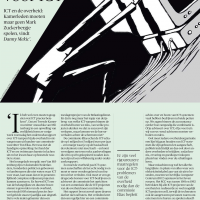IT and the government: MPs playing Mark Zuckerberg is not such a good idea
“I had to google what IT means, exactly,” chairperson of the House of Representatives Anouchka van Miltenburg candidly blurted out last Wednesday, upon receiving the inquiry report into governmental IT disasters presented to her by commission president Ton Elias. It wasn’t the most tactful thing she could have said: twitterers and the IT professional community burst out laughing and it earned her a lot of ridicule.
But in spite of the mockery, Van Miltenburg is not alone: with her, there are hundreds of politicians and whole buildings’ worth of government employees who don’t know what the letters ‘IT’ stand for, never mind being capable of directing complex, million-euro projects together. And even though IT has become one of the most important and most expensive cornerstones of the Dutch government, nobody has known since 1995 exactly how much money our country spends on it on a yearly basis. That’s a much bigger embarrassment than one representative admitting to have looked up an important definition, and actually having done her job very well by doing so.
The systematic ignorance about and lack of interest in digital systems has led to a nearly endless series of IT catastrophes on the government’s part: national emergency site crisis.nl, which already failed at its launch in 1999 and had to be rebuilt; the needless development of black boxes for our cars — before politicians conclusively decided against road pricing by the kilometre; C2000, the police communication system that failed at crucial moments; the Electronic Patient Records; the Public Transport Chip Card, insecure and expensive; werk.nl, the UWV’s job site that didn’t work; the tax administration’s benefits project. And that’s just the tip of the iceberg: what other government IT catastrophes are kept quiet, and what projects that seem to have gone well have horror stories from behind the scenes that we don’t know about?
The commission by Elias estimates the damage from IT projects to be between 1 and 5 billion euros a year – a margin you wouldn’t pass a grade school arithmetic test with – and then offers a series of suggestions, each of which might as well have been copied from any other inquiry report.
For example, the government shouldn’t purchase IT systems unless it’s really necessary, and they should learn more from past mistakes. It is also suggested that a code of conduct for IT companies be established, and the commission recommends creating a commission to oversee the government’s IT projects.
So much of the report is only stating the obvious that it won’t do much good. We’ve seen in the past that inventing some rules and putting together some commissions will at most lead to more creative record keeping by the parties involved, i.e. the IT companies, who want to make (and keep making) large amounts of money with governmental projects, but also the government employees who just want to continue managing their IT projects ‘normally’ and never saw any reason to act differently in the past either. And why would they?
If we want to do something about the number of failing government IT projects, it’s going to take drastic measures. First of all, politicians should more often concern themselves only with the ‘what’, and not with the ‘how’. It’s not uncommon that a failed IT project can be traced back to parliamentarians playing Mark Zuckerberg. Furthermore, when hiring external companies, there needs to be a strict separation between consultancy about and creation of IT systems: currently, one companies often takes up both roles. We’ve seen before in the area of accountancy how disastrous that combination can be. Consultancy with that sort of conflict of interest needs to be banned. Either you give advice about IT projects, or you carry them out.
Aside from that, every governmental organisation needs to maintain a list of IT systems that have been built and purchased, made publicly available so other governments can consult them as well: that way, knowledge, experience and cost comparisons can reach across the borders.
But perhaps the most important thing we need to do is that instead of outsourcing everything with a cable on it, we need to resurrect the National Computer Centre (RCC). Between 1981 and 1992, the RCC was involved in all government IT projects and carried out as many of them itself as it could, and the techies on its payroll were also the most qualified to hire external companies: they speak the same language.
Why should we spend millions of euros on external companies for something as important and as fundamental as IT? If between 1 and 5 billion euros are wasted every year, how much taxpayers’ money is leaking away at commercial rates — and how many programmers and white-hat hackers could be employed for that money?
It’s time for politicians, the government and government employees to stop thinking of IT as an ‘issue’ that needs to be ‘resolved’, and instead think of it as a craft that needs to be practised by professionals. Professionals working directly for the government. Because it’s not politicians who can resolve IT problems; only IT professionals can.

Leave a Reply